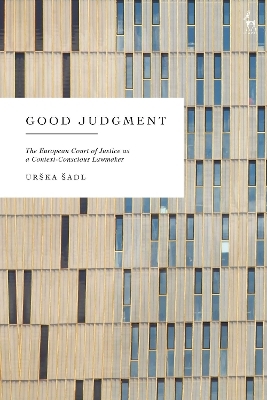
Good Judgment
Hart Publishing (Verlag)
978-1-5099-6812-1 (ISBN)
Urška Šadl is Part-time Professor at the European University Institute, Italy, and Associate Professor at the Faculty of Law, University of Copenhagen, Denmark.
1. Introduction
a. The Main Claim
b. The Structure
i. The Premise
ii. Contribution
c. The Outline
d. In Sum
Part One: The Analytical Framework
2. Context Conscious Judging
a. Four Perspectives on Context Conscious Judging
i. Maximising Legal Values with Sound Legal Arguments
ii. Maximising Power with Strategic Solutions
iii. Maintaining Authority
iv. Minimising Conflict by Muddling Through
b. The Court’s Context Conscious Reasoning and Political Power
3. Good Judgement
a. From Context Conscious Judging to Good Judgment
i. The Baseline: Model Application of Law and the Structure of Typical Justification
ii. Non-binary Decisions: An Illustration
iii. Conflicting Interests
iv. Distinctions
b. Three Types of Good Judgment
c. Conclusion
4. Operationalising Good Judgment
a. Three Steps of the Analysis
b. The Parameters of Case Law
i. Legal Characteristics
ii. Case Characteristics
c. Annotation of Judgments
Conclusion to Part One
Part Two: The Mechanics of Good Judgment
5. Persons
a. Introduction
b. The Rules Governing the Free Movement of Persons and European Citizens
i. Treaty Rights, Legislative Acts, and the Competence to Regulate Free Movement
ii. Citizenship Rights Directive: Consolidating Legislative Instruments, Case Law and Conflict
c. Free Movement Disputes: Legal Issues
d. The Parameters of Good Judgement
i. Non-sanctioning Europeanisation of National Policies through the Prism of Proportionality, Discrimination and Compatibility Review
ii. Individual Protection and Deferral of Authority in Judgments Upholding European Rights and Principles
iii. Preserving State Autonomy in Judgments Advancing Free Movement of Persons Law
iv. Relevant Information About Free Movement of Persons Cases
e. Emblematic Judgments: Facts, Justification, Context, Implications
i. Non-sanctioning Europeanisation of National Policies
ii. Deferential Upholding of European Rights
iii. Bounded Undesirable Interpretation
f. Upholding Conflicting Interests – The Long Term 1954 – 2022
6. Goods
a. Introduction
b. The Legal Framework of Free Movement of Goods
i. The Ambiguous Heart of the System
ii. Rights at Stake and Interests at Play in the Case-law
c. Free Movement Judgments: An Overview of Legal Questions
d. The Parameters of Good Judgment
i. Non-sanctioning Europeanisation of National Policies through the Prism of Proportionality, Discrimination and Compatibility Review
ii. Deferral of Authority in Judgments Upholding Free Movement Rights and Principles
iii. Preserving State Autonomy in Judgments Advancing Free Movement of Goods: Bounded Undesirable Interpretation
iv. Relevant Information about Free Movement of Good Cases
e. Emblematic Judgments: A Close Up
i. The Non-sanctioning Europeanisation of National Policies
ii. The Deferential Upholding of Free Movement Rights
iii. The Bounded Undesirable Interpretation
f. Upholding Conflicting Interests: The Long Term
Part Three: The Mechanisms of Good Judgment
Introduction
i. Main Finding
ii. Unpacking the Findings: The Roadmap
a. Case Motivated Good Judgment
i. The Applicants
ii. The Case
iii. The Institution (Idiosyncratic Good Judgment)
b. Context-Motivated Good Judgment
i. Recognising the Stakes
ii. Honouring Fragile Consensus/Equilibrium
iii. Adjusting to the Climate
c. Alternative Tools of Context Conscious Judging
i. Reframing Disputes
ii. Mixed Signals
iii. Low Stakes/Waiting for the Tide to Turn
d. Appraisal
8. Conclusion
a. Summary of the Argument
b. Contribution
c. Is Good Judgment a Good Idea?
| Erscheinungsdatum | 16.08.2024 |
|---|---|
| Verlagsort | Oxford |
| Sprache | englisch |
| Maße | 156 x 234 mm |
| Themenwelt | Recht / Steuern ► Allgemeines / Lexika |
| Recht / Steuern ► EU / Internationales Recht | |
| Recht / Steuern ► Öffentliches Recht | |
| Sozialwissenschaften ► Politik / Verwaltung ► Europäische / Internationale Politik | |
| ISBN-10 | 1-5099-6812-1 / 1509968121 |
| ISBN-13 | 978-1-5099-6812-1 / 9781509968121 |
| Zustand | Neuware |
| Informationen gemäß Produktsicherheitsverordnung (GPSR) | |
| Haben Sie eine Frage zum Produkt? |
aus dem Bereich


